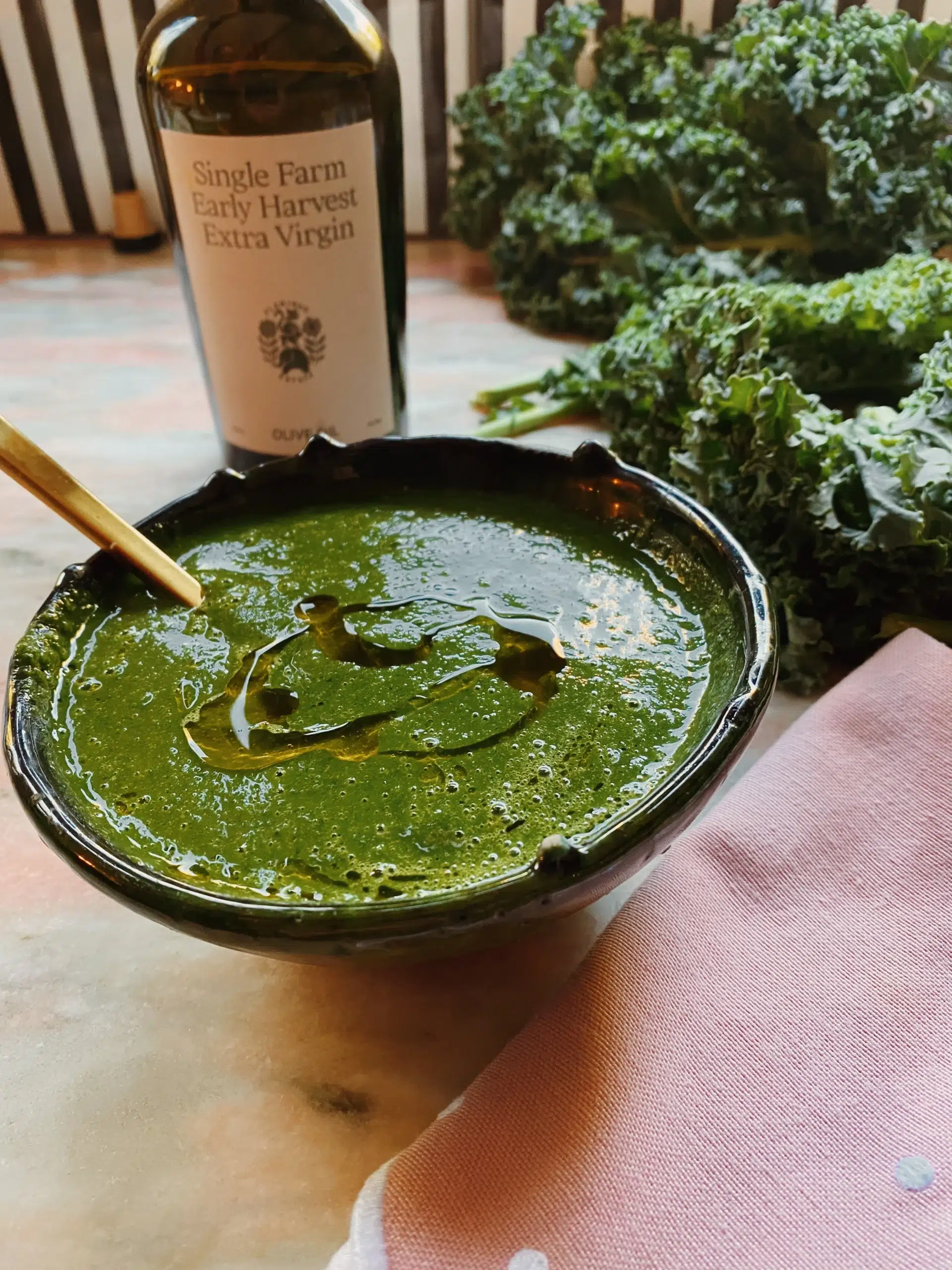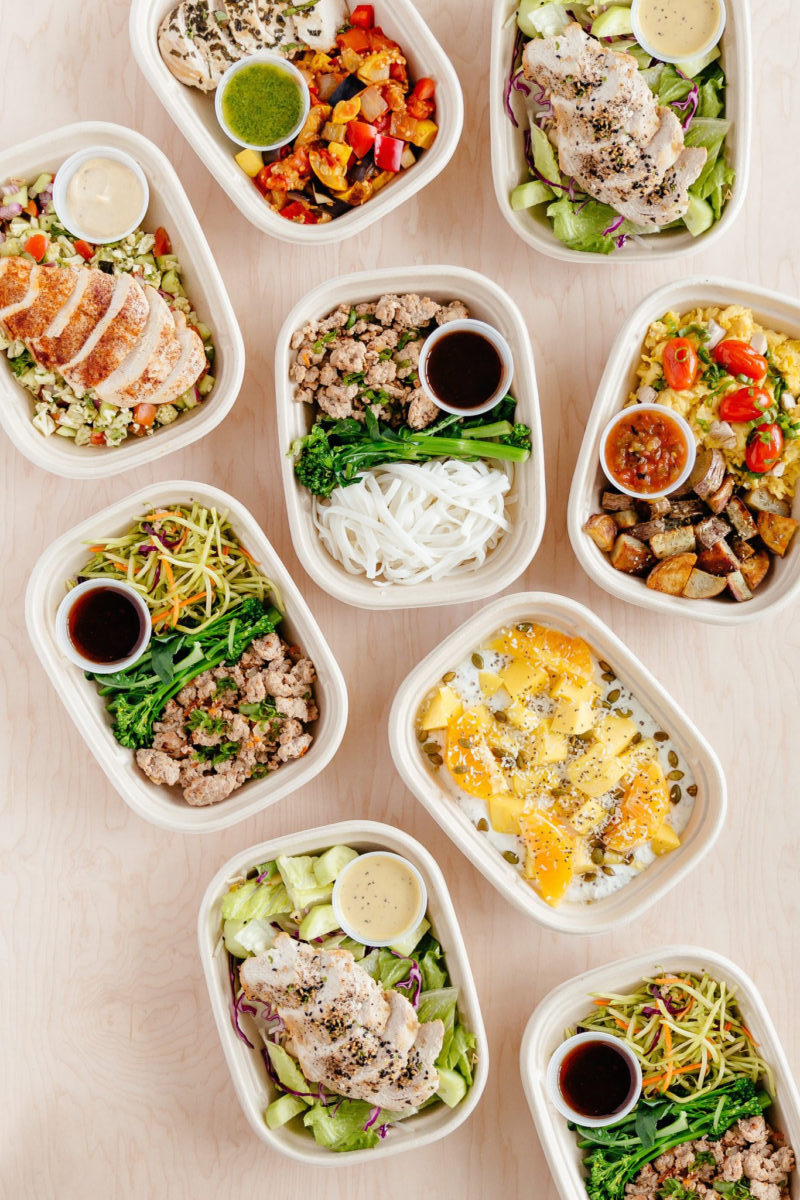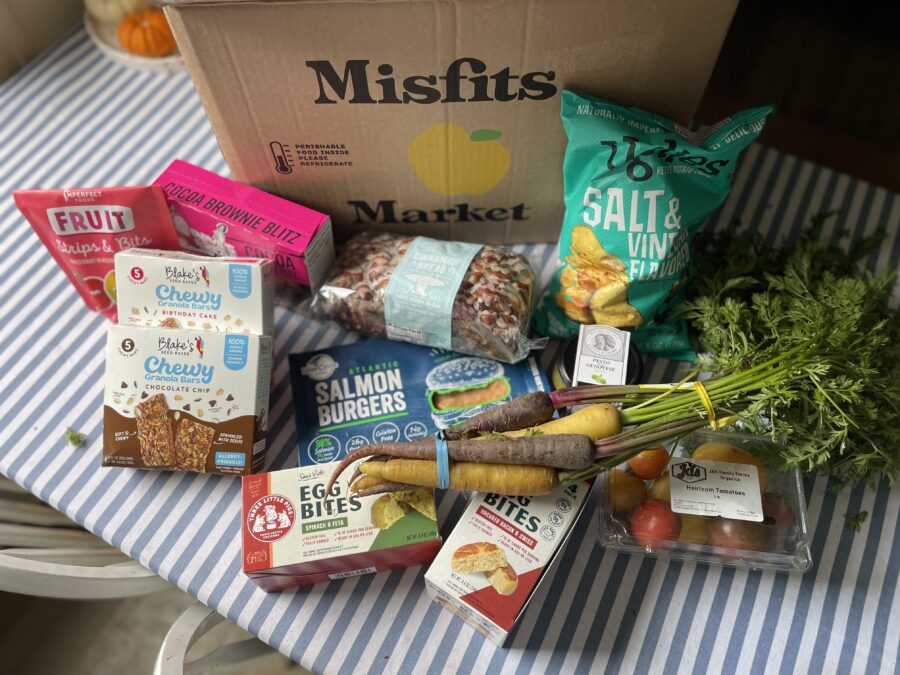
Is Misfits Market A Good Option For Affordable Produce?
A holdover from the pandemic that has impacted our lifestyle the most: online grocery shopping, hands down. For more than three years now, we buy our groceries almost exclusively using Instacart pickup. Like many families juggling multiple schedules, we discovered that the efficiency of online shopping far outweighs the occasional irritation that happens when you get a shopper who just, well, doesn’t seem to see the world the same way that you do. Like the one I had recently who replaced a red onion with a red bell pepper. (Which…okay! This is sort of the cost of getting someone to shop for me. We still tip generously!)
It’s true that when I want something I’m very particular about or we’re cooking something special, I prefer to do the shopping myself. But when it comes to the weekly heavy hitters, send me to that Buy It Again button and let’s get on with our lives.
But this gets… boring. And with a small child who is alternately adventurous or suspicious of new foods, it can be a real challenge to find inspiration when the stock is basically all the same, day in and day out. I decided to start exploring some online markets out there, to see if any of them seemed like a possible fit for our needs: New-to-us brands and foods that we can’t find in our regular shops; a very flexible plan that didn’t lock us in; a company with sustainable practices and values we feel good about supporting.
Enter: Misfits Market.
The Misfits Market Mission
Started in 2018 by serial entrepreneur Abhi Ramesh, the goal of the service is to address the outrageous food waste caused by traditional grocery store practices. The United States alone discards over 60 million tons of food per year, and 40% of that is due to grocery stores, restaurants, and food service companies. Ramesh, on an apple-picking outing with his now-wife, saw the astounding amount of apples that were left rot on the ground to rot, first drawing his attention to the problem. “I saw just firsthand how much food goes to waste at the farm level,” he told Inc. “I was shocked at the time.”
“The United States alone discards over 60 million tons of food per year, and 40% of that is due to grocery stores, restaurants, and food service companies.”
Much of the produce rejected by food and grocery services is due to superficial reasons: Fruit and veg that is misshapen, “ugly,” over- or undersized, but otherwise perfectly nutritious and edible won’t meet traditional grocery store standards. Anyone who has grown their own food knows that looking wonky is kind of organic produce’s thing, even if it is tastier and healthier than the picture-perfect counterpart at Kroger.
Growing up in Philadelphia, Ramesh was aware of food scarcity in his own city. He saw an opportunity to bridge the gap between industry-rejected food waste and the families who weren’t able to access full-price goods at far away stores. Misfits Market ships “unwanted” produce (the misfits!) to drive down industry waste and make healthy, organic produce available at discounted prices of up to 40% off.
“Misfits Market ships “unwanted” produce (the misfits!) to drive down industry waste and make healthy, organic produce available at discounted prices of up to 40% off.”
After Misfits Market had mastered the produce waste market, they turned their gaze toward the rest of the grocery aisles: Turns out, even pantry goods can get rejected for superficial reasons (like smashed packaging). And while organic produce is the cornerstone of their service, they have built out their inventory to include most household items––including pet food and wine––all at discounted prices. Sounded promising to us!
How it works (and what we ordered)
You are by now familiar with the model: Join for “free” (you still give them all your info, including payment details); personalize preferences and add to your cart during your shopping window; an automatic check out processes whatever is in your cart at the end of the window; the food is delivered on your delivery date. Pause and skip anytime––you know the drill!
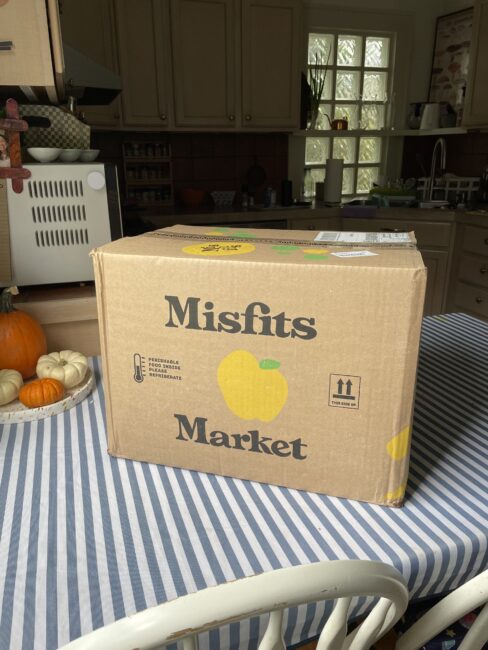
Misfits Market has a Flex Plan that is perfect if you’re somewhat noncommittal like I am (I personally hate feeling locked into a subscription, sight unseen). I pay a minimum of $45 for an order and that’s basically it. If I forget to shop during that window then I just miss that week at no cost, nbd.
One of the reasons we hadn’t really explored too many of the online national delivery markets out there is that we live in a mid-size city in the Blue Ridge Mountains. This makes delivery timings tricky, which can be a problem if you’re looking for fresh, perishable goods. Plus, we have a thriving local farming community, so I err on the side of hitting the farmer’s markets or getting a local CSA for our produce needs. So while I wanted to check out some of the organic produce Misfits Market is known for, I also wanted to use this order as a chance to meet some of the other needs of my household: specifically, pantry goods and frozen foods.
The prepackaged snacks and pantry goods that my child seems to somehow survive on (toddler bodies are incredible machines fueled by pasta or air, it’s amazing) are just chock full of sodium and preservatives. So I was excited to hunt for some fun new snacks that were lighter on the not-so-great ingredients.
I’ll be honest, a lot of what we ordered was kind of random. The truth is that I forgot I was shopping and got distracted before the order processed. My husband and I have a shopping habit that isn’t totally sympatico with an auto-check out: We typically start a cart in the same account, and add to it throughout the day as we work. So the box we ended up with wasn’t so much a thoughtful selection as just… vibes.
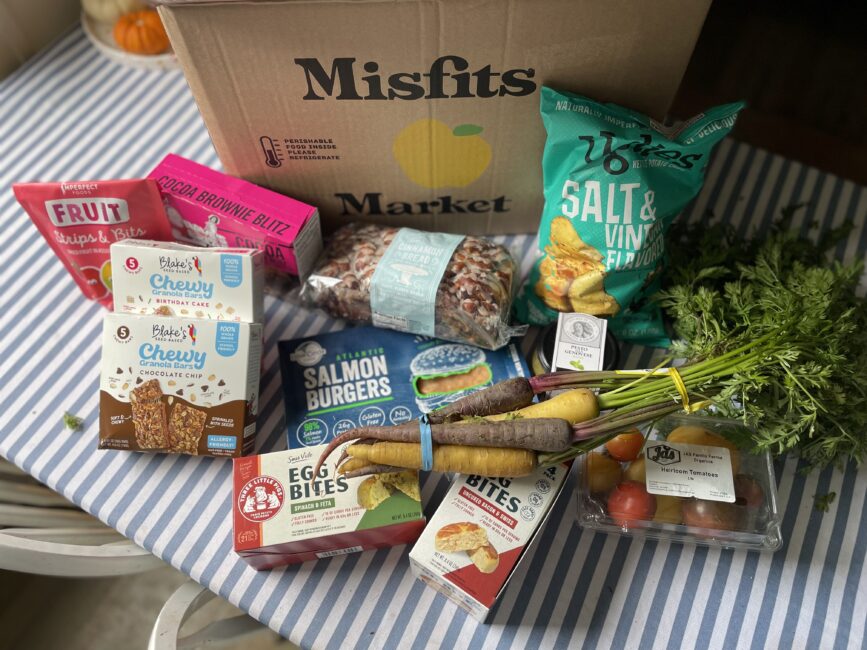
Here’s what we got:
- 2 frozen sous vide egg cups ($5.54 each for 4 ct boxes)
- frozen salmon burgers ($7.36 for 2 5oz patties)
- a bag of dried fruit bits and strips ($5.04 for 4.2 oz)
- a loaf of cinnamon bread ($5.54 for 20 oz)
- a bag of “ugly” salt and vinegar kettle chips ($4.33 for 6 oz)
- a jar of fancy pesto ($3.42 for 7.9 oz)
- 2 boxes of organic granola bars in fun new-to-us flavors ($4.53 each for 5 ct boxes)
- a box of organic, lower sugar brownies ($6.05 for 4 ct)
- a bunch of organic rainbow carrots ($2.35)
- 1lb of organic heirloom tomatoes ($4.35)
All of this came out to $58.18. Add .79 cents for tax, a cold pack fee of $3.99, and a shipping fee of $9.99 for a grand total of $72.95.
What we thought
The box arrived when expected, though it was a little worse-for-wear. The cold-pack was almost completely melted, and the frozen foods had totally defrosted, so they went straight into the fridge. (Again, we live in a somewhat difficult area for deliveries, so it wasn’t entirely unexpected.) I work from home and was able to get the box right when it came, but if you live somewhere that means a long wait with a flimsy little cold pack, you might want to skip the frozen stuff.
But! The sous vide egg bites and the salmon burgers were divine. They were easily our favorite things in the box. Since they’d defrosted we had to eat them right away, but we weren’t mad about it.
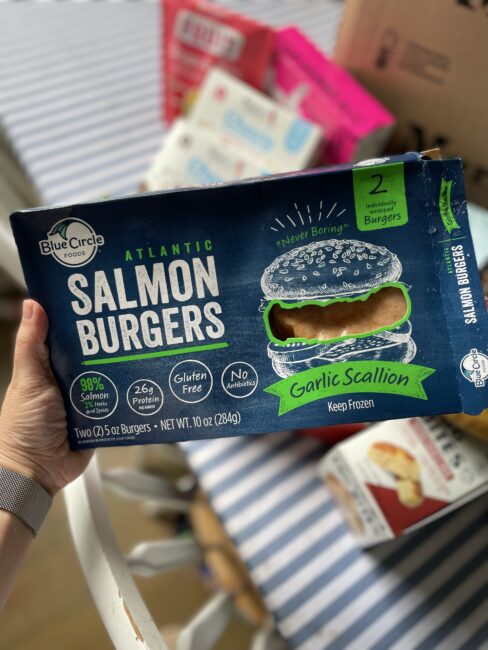
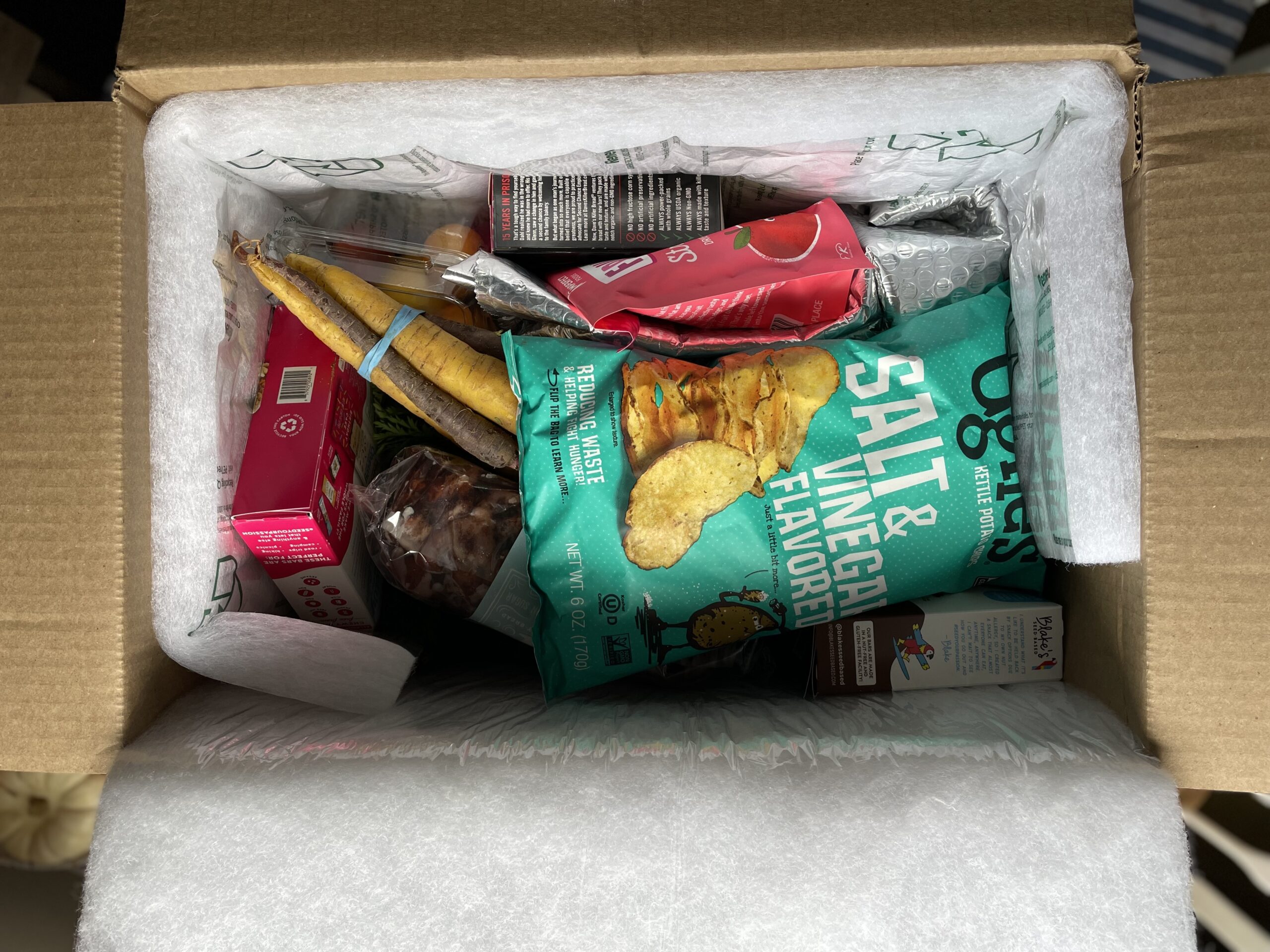
The produce was delicious, fresh, and… normal looking? This made me wonder if these particular carrots and tomatoes weren’t rejected for superficial reasons at all, but because of the other big culprit in food waste: surplus. So like all the apples on the ground in the experience that sparked the whole business, sometimes there’s just “too much,” a problem that feels surreal when you know that this country has 34 million people living with food insecurity.
“If you’re anything like me and subject to getting distracted and forgetting about draft carts, maybe this isn’t the service model for you.”
The snacks, all what I would call upgraded, healthier versions of the stuff we typically get at the supermarket, were almost all a hit with our kid (the brownies, sadly, had nuts in them–which is blasphemy in our house).
I would call the cart processing before we’d actually finalized it “user error,” but I would note that if you’re anything like me and subject to getting distracted and forgetting about draft carts, maybe this isn’t the service model for you. Or maybe you do better with alarms than I do. But consider yourself warned!
The bottom line
As far as cost goes: The produce was by far the most obviously discounted in price. The rest of the foods were comparable if not slightly cheaper than hitting our local grocery store for similar caliber snacks and frozen goods. The draw for us wouldn’t necessarily be the discount here, but that the selections were broader than what we can find at home.
The packaging was relatively eco-friendly. The cold pack was a reusable ice pack, and aside from one part of the insulated box, the entire container was recyclable. The carrots were loose but undamaged, and the heirloom tomatoes were in a protective plastic container.
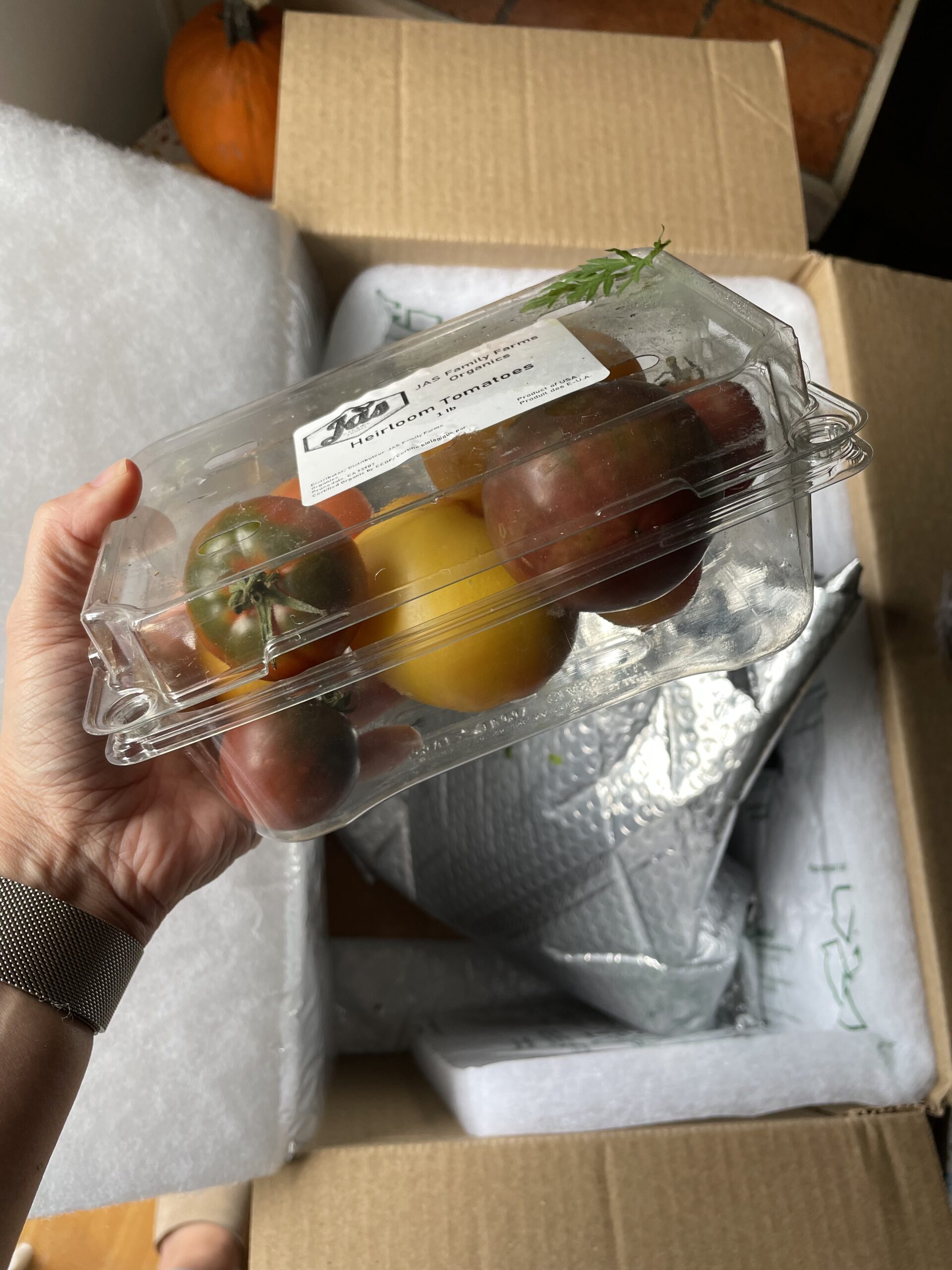
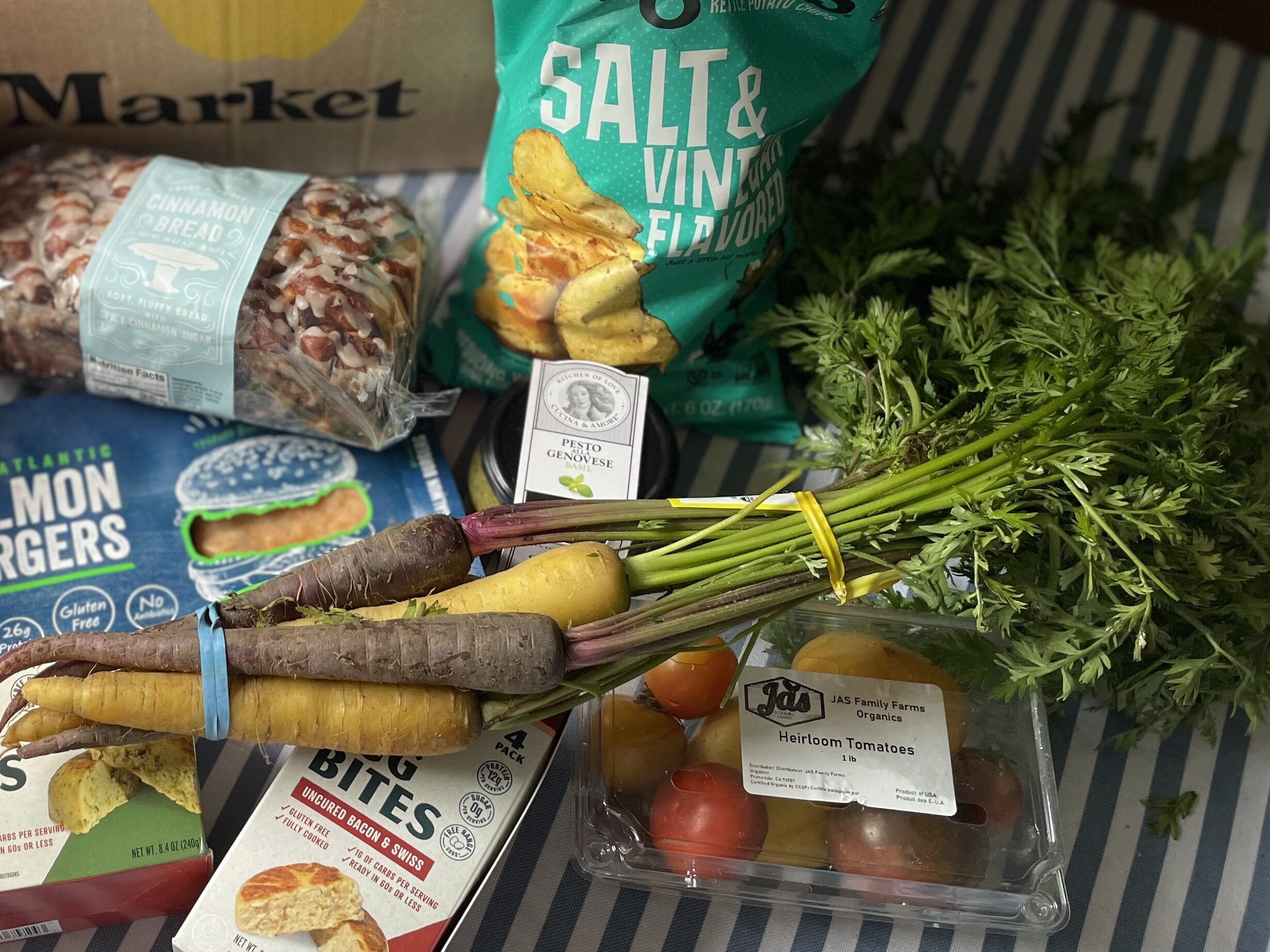
I am compelled by the mission of Misfits Market. Rather than just adding another shop to our rotation, this felt like buying groceries that do good. If I’m going to be spending the money or the time to order food online anyway, I like where these dollars were going. (The brand is also working on a pilot program to start accepting SNAP/EBT, which feels especially aligned with their mission!) I’ll personally probably stick with local for my cold stuff, and prioritize CSA boxes from nearby farms for our produce. The Flex Plan is perfect for us, allowing me to grab a few pantry items to spice up the rotation at a slight discount but a much higher quality.
Key Takeaways:
- Misfits Market takes organic produce rejected for superficial reasons from traditional groceries and sells it at up to 40% off retail price.
- Various subscription plans are available including a Flex Plan for less commitment.
- Shopping windows each week allow you to browse their organic and non-GMO selections of produce, deli, seafood, pantry, pet, household goods, and more with an auto-processing and regular delivery day.
- Packaging is minimal and pretty eco-friendly, with reusable ice packs, almost entirely recyclable containers, and minimal to no plastic on the produce.
- In terms of discounts, your best deals will be on produce; all other goods are basically the same as our grocery store.
- Auto-processing is not totally foolproof– user be aware of your shopping windows so as to get the exact items you’re looking for! (Unless you like to surprise yourself!)
Stephanie H. Fallon is a writer originally from Houston, Texas. She has an MFA from the Jackson Center of Creative Writing at Hollins University. She lives with her family in the Blue Ridge Mountains of Virginia, where she writes about motherhood, artmaking, and work culture. You can find her on Instagram or learn more on her website.

